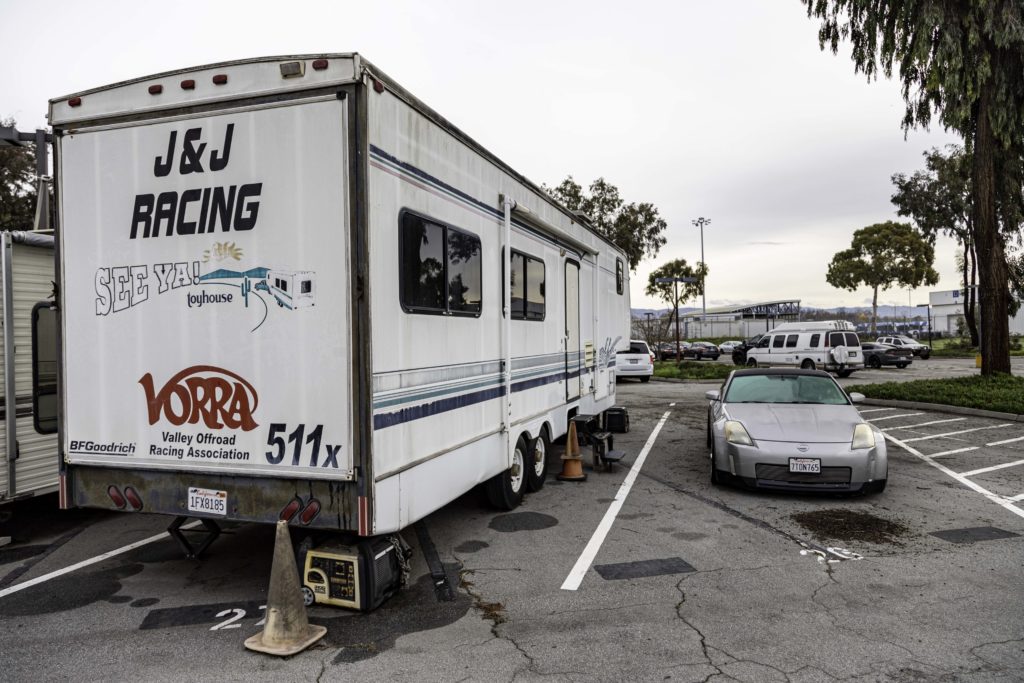Adan Miranda used to fall asleep during his long commute. The VTA bus driver lives in Elk Grove, a four-hour drive in traffic, because he can’t afford a home in San Jose.
After nodding off at the wheel several times on his way home in 2003, Miranda signed up for a permit program letting VTA workers sleep in camping vehicles in the agency’s parking lots. Now he only commutes home on the weekends. Miranda said he hasn’t fallen asleep at the wheel since. For decades, the permit program has helped dozens of VTA employees avoid long, exhausting commutes.
But the public transit agency began phasing out the permit program in 2018 as it considered leasing its properties to address a budget shortfall, which cut into local housing options for VTA employees. Miranda and his colleagues say the agency needs a priority check, especially since San Jose and VTA are talking about building tiny homes for unhoused people at two VTA sites.
“VTA should be worrying about taking care of their own employees before they take care of other people,” Miranda told San José Spotlight. “Why don’t they make tiny homes for us first and see how that works?”
VTA’s permit system allows some employees to sleep in their vehicles at the agency’s Cerone yard in North San Jose—one of the sites being considered for the tiny homes project. The program previously allowed workers to park RVs at four locations, said John Courtney, president of the Amalgamated Transit Union Local 265, VTA’s largest union.


As permit holders quit, retire or their permits expire, the agency no longer reissues them. In 2018, there were 28 active permits. There are about 16 left, a VTA representative said. Meanwhile, the cost of living in San Jose continues to soar, forcing VTA workers who can’t afford to live there to commute long distances from more affordable cities.
After working shifts that can last 12 hours or longer, drivers often leave work exhausted, Courtney said, but VTA operators’ commute times aren’t calculated in their daily driving limits.
“You can only drive a certain amount of hours, and then you need rest,” Courtney told San José Spotlight. “They’re creating unsafe conditions by continuing to not allow us to park RVs here.”
Miranda is one of the few remaining permit holders. He said he knows several VTA drivers who want permits, but can’t get them.
“I’m fine because obviously I’ve got a trailer there,” he said. “But if they were to allow it, there would be more.”
Agency spokesperson Stacey Hendler Ross could not say whether VTA has plans to offer any alternatives to its workers. The San Jose City Council voted last month to pursue a plan to convert two lots on VTA properties into tiny homes for homeless residents. But the decision is far from final, Ross said.
“Our employees are our priority, and VTA is not going to make any decisions about anything that doesn’t take our employees into account,” she told San José Spotlight. “We understand that our employees drive long days and some drive long distances. We’ve tried to accommodate some of them.”
A long commute
Another VTA bus driver, who requested anonymity for fear of retribution, said she used to have a permit and slept in a fifth-wheel trailer on VTA property several years ago. After getting engaged to another employee, the worker said she allowed her permit to expire and moved into a San Jose house with her new fiancé.
When her fiancé died suddenly in 2017, she moved in with her parents in Hollister, a more-than 50-mile commute. VTA refused to reissue her permit, saying it was phasing out the program, the driver said.
“I had to move out of the house that we were in because I couldn’t afford the rent,” she told San José Spotlight. “The spot where (my trailer) used to be was currently open, but they didn’t let me bring my fifth-wheel back.”
The exhaustion of her long commute prevents the driver from working overtime, resulting in smaller paychecks. Gas prices and the wear and tear on her vehicle have eaten into what’s left of her pay, she said.
“They wonder why we’re short-tempered or tired,” she said. “Commuting all day and driving all day for a living is hard on us.”
Contact Brian Howey at [email protected] or @SteelandBallast on Twitter.



Leave a Reply
You must be logged in to post a comment.